Ditapis dengan

Framing global mathematics
This open access book is about the shaping of international relations in mathematics over the last two hundred years. It focusses on institutions and organizations that were created to frame the international dimension of mathematical research. Today, striking evidence of globalized mathematics is provided by countless international meetings and the worldwide repository ArXiv. The text follows …
- Edisi
- -
- ISBN/ISSN
- 9783030956837
- Deskripsi Fisik
- xx, 384p., il.
- Judul Seri
- -
- No. Panggil
- 372.7 NOR f

Student misconceptions and errors in physics and mathematics
This open access report explores the nature and extent of students’ misconceptions and misunderstandings related to core concepts in physics and mathematics and physics across grades four, eight and 12. Twenty years of data from the IEA’s Trends in International Mathematics and Science Study (TIMSS) and TIMSS Advanced assessments are analyzed, specifically for five countries (Italy, Norway,…
- Edisi
- -
- ISBN/ISSN
- 9783030301880
- Deskripsi Fisik
- VIII, 165 p.
- Judul Seri
- -
- No. Panggil
- 370.9 STU s
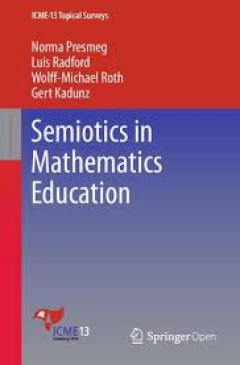
Semiotics in mathematics education - ICME-13 topical surveys
- Edisi
- -
- ISBN/ISSN
- 9783319313702
- Deskripsi Fisik
- -
- Judul Seri
- -
- No. Panggil
- 370 PRE s
- Edisi
- -
- ISBN/ISSN
- 9783319313702
- Deskripsi Fisik
- -
- Judul Seri
- -
- No. Panggil
- 370 PRE s

Theories in and of mathematics education theory strands in German speaking co…
In the 1970s and 1980s, mathematics education was established as a scientific discipline in German-speaking countries through a process of institutionalization at universities, the foundation of scientific media, and a scientific society. This raised the question of how far the didactics of mathematics had been developed as a scientific discipline. This question was discussed intensely in th…
- Edisi
- -
- ISBN/ISSN
- 9783319425894
- Deskripsi Fisik
- -
- Judul Seri
- -
- No. Panggil
- 370 AHS t

Theories in and of mathematics education theory strands in German speaking co…
In the 1970s and 1980s, mathematics education was established as a scientific discipline in German-speaking countries through a process of institutionalization at universities, the foundation of scientific media, and a scientific society. This raised the question of how far the didactics of mathematics had been developed as a scientific discipline. This question was discussed intensely in th…
- Edisi
- -
- ISBN/ISSN
- 9783319425894
- Deskripsi Fisik
- -
- Judul Seri
- -
- No. Panggil
- 370 AHS t
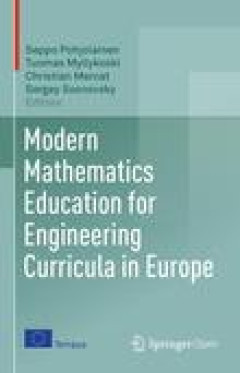
Modern mathematics education for engineering curricula in Europe :A comparati…
- Edisi
- -
- ISBN/ISSN
- 9783319714165
- Deskripsi Fisik
- VI, 182 p.
- Judul Seri
- -
- No. Panggil
- 370 MOD m
- Edisi
- -
- ISBN/ISSN
- 9783319714165
- Deskripsi Fisik
- VI, 182 p.
- Judul Seri
- -
- No. Panggil
- 370 MOD m
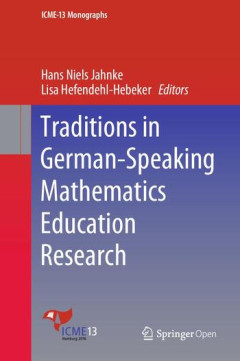
Traditions in German-speaking mathematics education research
This open access book shares revealing insights into the development of mathematics education research in Germany from 1976 (ICME 3 in Karlsruhe) to 2016 (ICME 13 in Hamburg). How did mathematics education research evolve in the course of these four decades? Which ideas and people were most influential, and how did German research interact with the international community? These questions are a…
- Edisi
- -
- ISBN/ISSN
- 9783030110697
- Deskripsi Fisik
- viii, 278p. : ill.
- Judul Seri
- -
- No. Panggil
- 370 JAH t

Social and political dimension of mathematics education:current thinking
This book examines the current thinking on five critical social and political areas in mathematics education. It focuses on material conditions in teaching and learning, and details features of social life and their influence on mathematics teaching, learning and achievement. Following an introduction, the first section addresses equitable access and participation in quality mathematics educati…
- Edisi
- -
- ISBN/ISSN
- 9783319296555
- Deskripsi Fisik
- vii, 37p.:
- Judul Seri
- -
- No. Panggil
- 370
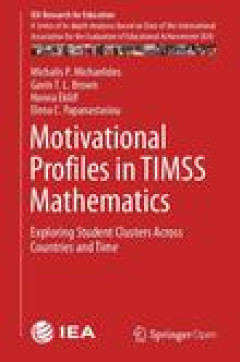
Motivational profiles in TIMSS mathematics
This open access book presents a person-centered exploration of student profiles, using variables related to motivation to do school mathematics derived from the IEA’s Trends in International Mathematics and Science Study (TIMSS) data. Statistical cluster analysis is used to identify groups of students with similar motivational profiles, across grades and over time, for multiple participating…
- Edisi
- -
- ISBN/ISSN
- 9783030261832
- Deskripsi Fisik
- xi, 144p.: ill.
- Judul Seri
- -
- No. Panggil
- 510.71 MIC m
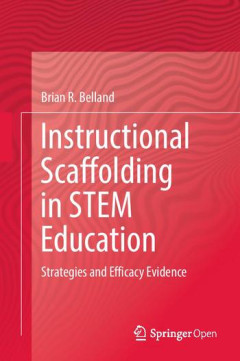
Instructional scaffolding in STEM education :strategies and efficacy evidence
This book uses meta-analysis to synthesize research on scaffolding and scaffolding-related interventions in STEM (science, technology, engineering, and mathematics) education. Specifically, the volume examines the extent to which study quality, assessment type, and scaffolding characteristics (strategy, intended outcome, fading schedule, scaffolding intervention, and paired intervention) influe…
- Edisi
- -
- ISBN/ISSN
- 9783319025650
- Deskripsi Fisik
- xi, 144p. : ill.
- Judul Seri
- -
- No. Panggil
- 510.71 BEL i
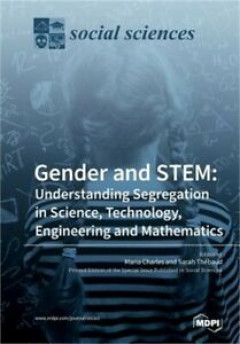
Gender and STEM :understanding segregation in science, technology, engineerin…
This volume features thirteen original chapters on the causes and consequences of gender segregation in scientific, technical, engineering, and mathematics (“STEM”) occupations and fields of study. Although women have made great strides in equalizing access to labor markets and higher education, many STEM fields—particularly in the physical sciences and engineering—remain strongholds of…
- Edisi
- -
- ISBN/ISSN
- 9783038971474
- Deskripsi Fisik
- ix, 271p. : ill.
- Judul Seri
- -
- No. Panggil
- 510.71 GEN g
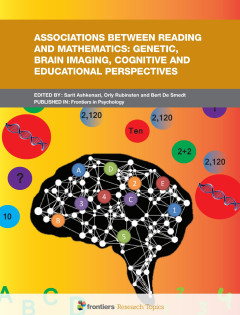
Associations between reading and mathematics :genetic, brain imaging, cogniti…
Converging evidence demonstrates a strong link between reading and mathematics: multiple cognitive processes are shared between reading and mathematics, including the representation and retrieval of symbolic information, attention, working memory, and cognitive control. Additionally, multiple brain networks are involved in both math and reading, and last, common genetic factors might influence …
- Edisi
- -
- ISBN/ISSN
- 9782889452651
- Deskripsi Fisik
- 113p. : ill.
- Judul Seri
- -
- No. Panggil
- 370.1523 ASS a
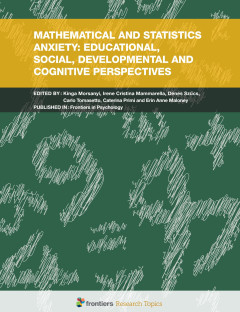
Mathematical and statistics anxiety :educational, social, developmental and c…
Mathematical anxiety is a feeling of tension, apprehension or fear which arises when a person is faced with mathematical content. The negative consequences of mathematical anxiety are well-documented. Students with high levels of mathematical anxiety might underperform in important test situations, they tend to hold negative attitudes towards mathematics, and they are likely to opt out of elect…
- Edisi
- -
- ISBN/ISSN
- 9782889450763
- Deskripsi Fisik
- -
- Judul Seri
- -
- No. Panggil
- 519.5 MAT m
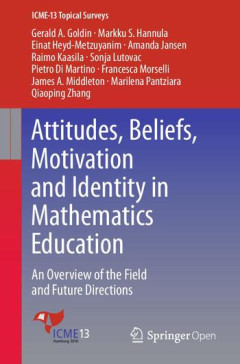
Attitudes, beliefs, motivation and identity in mathematics education :an over…
This book records the state of the art in research on mathematics-related affect. It discusses the concepts and theories of mathematics-related affect along the lines of three dimensions. The first dimension identifies three broad categories of affect: motivation, emotions, and beliefs. The book contains one chapter on motivation, including discussions on how emotions and beliefs relate to moti…
- Edisi
- -
- ISBN/ISSN
- 9783319328102
- Deskripsi Fisik
- vii, 35p. : ill.
- Judul Seri
- -
- No. Panggil
- 510.71 GOL a
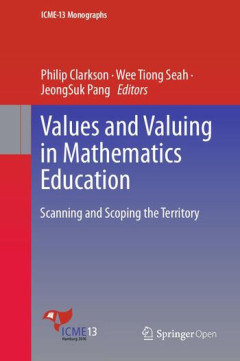
Values and valuing in mathematics education :scanning and scoping the territory
This engaging open access book discusses how a values and valuing perspective can facilitate a more effective mathematics pedagogical experience, and allows readers to explore multiple applications of the values perspective across different education systems. It also clearly shows that teaching mathematics involves not only reasoning and feelings, but also students’ interactions with their cu…
- Edisi
- -
- ISBN/ISSN
- 9783030168926
- Deskripsi Fisik
- x, 222p. : ill.
- Judul Seri
- -
- No. Panggil
- 510.71 VAL v
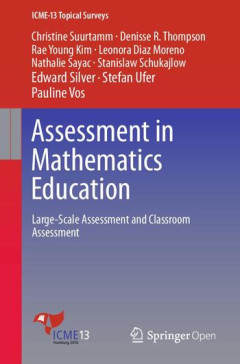
Assessment in mathematics education :large-scale assessment and classroom ass…
This book provides an overview of current research on a variety of topics related to both large-scale and classroom assessment. First, the purposes, traditions and principles of assessment are considered, with particular attention to those common to all levels of assessment and those more connected with either classroom or large-scale assessment. Assessment design based on sound assessment prin…
- Edisi
- -
- ISBN/ISSN
- 9783319323947
- Deskripsi Fisik
- ix, 38p. : ill.
- Judul Seri
- -
- No. Panggil
- 510.71 ASS a
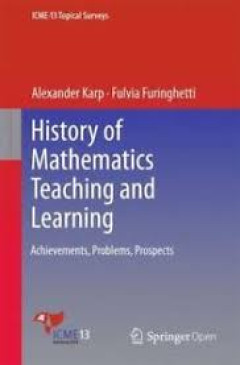
History of mathematics teaching and learning
The history of mathematics education is afield of study that is both old and new. It is old because scholarly works in the field began to appear over 150 years ago. Schubring (2014a) refers to Fisch (1843), as possibly thefirst work on the subject published in Germany. In the United States thefirst dissertations on mathematics education (Jackson 1906; Stamper 1906) focused specifically on i…
- Edisi
- -
- ISBN/ISSN
- 9783319316154
- Deskripsi Fisik
- -
- Judul Seri
- -
- No. Panggil
- 510.71 KAR h
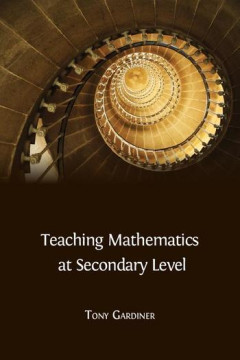
Teaching mathematics at secondary level
Teaching Mathematics is nothing less than a mathematical manifesto. Arising in response to a limited National Curriculum, and engaged with secondary schooling for those aged 11 ̶ 14 (Key Stage 3) in particular, this handbook for teachers will help them broaden and enrich their students’ mathematical education. It avoids specifying how to teach, and focuses instead on the central principles a…
- Edisi
- -
- ISBN/ISSN
- 9781783741397
- Deskripsi Fisik
- vii, 316p. : ill.
- Judul Seri
- -
- No. Panggil
- 510.712 GAR t

The mathematics education of prospective secondary teachers around the world
This volume shares and discusses significant new trends and developments in research and practices related to various aspects of preparing prospective secondary mathematics teachers from 2005–2015. It provides both an overview of the current state-of-the-art and outstanding recent research reports from an international perspective. The authors completed a thorough review of the literature by …
- Edisi
- -
- ISBN/ISSN
- 9783319389653
- Deskripsi Fisik
- 58 p.
- Judul Seri
- -
- No. Panggil
- 370 MAT m

The philosophy of mathematics education
This survey provides a brief and selective overview of research in the philosophy of mathematics education. It asks what makes up the philosophy of mathematics education, what it means, what questions it asks and answers, and what is its overall importance and use? It provides overviews of critical mathematics education, and the most relevant modern movements in the philosophy of mathematics. A…
- Edisi
- -
- ISBN/ISSN
- 9783319405698
- Deskripsi Fisik
- 26 p.
- Judul Seri
- -
- No. Panggil
- 510.71 PHI p
 Karya Umum
Karya Umum  Filsafat
Filsafat  Agama
Agama  Ilmu-ilmu Sosial
Ilmu-ilmu Sosial  Bahasa
Bahasa  Ilmu-ilmu Murni
Ilmu-ilmu Murni  Ilmu-ilmu Terapan
Ilmu-ilmu Terapan  Kesenian, Hiburan, dan Olahraga
Kesenian, Hiburan, dan Olahraga  Kesusastraan
Kesusastraan  Geografi dan Sejarah
Geografi dan Sejarah